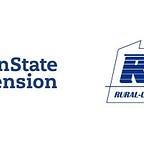Friday On The Farm ~ December 17, 2021
Farming Through Failure ~ When Mother Nature kills a corn crop
Hurricane Ida hit Pennsylvania on September 1st with historic rains and wind events. You may remember the storm for the flooding it caused in Center City Philadelphia where people were seen the next day floating down some of the major roads that were turned into lazy rivers. In Southern Chester County we were walloped with flooding and tornadoes leading to countless hours of emergency responders working to rescue people from situations that are quite foreign to this region.
Unfortunately, one of our corn fields was right in the path of one of the more severe tornadoes in southern Chester County. Approximately 19 acres of the 24-acre field was completely flattened. With the timing of the storm and the growth stage of the corn when it was damaged it prevented the damaged acreage from being harvestable. Thankfully our damage was limited to this field and no other property or human cost was incurred.
So, what do you do with a corn field that you cannot harvest? The first step was to survey the damage which was when we realized that the majority of the field was unharvestable. The corn was not bent over, it was snapped or completely ripped apart from its root structure. The other obstacle with making an attempt at harvesting the field was the building materials and tree tops that ended up in the field.
If you are unfamiliar with crop insurance, I’ll try to briefly explain how that worked in this instance. We have crop insurance on all of our corn crop. This allows us to get paid up to a certain percentage of our corn crop that we did not get to harvest because of the tornado. For example, if the average yield over the last 10 years on this field is 200 bushels per acre and we have 75% insurance on the field we would be paid for 150 bushels per acre for the insurance claim. The goal of crop insurance is to prevent a complete loss and to allow farmers to recoup their input cost in case of a complete failure. Our crop insurance premium is subsidized by the federal government as a way to encourage more farms to enroll in the program. The USDA looks at these programs as a way to stabilize the United States food system and to make it more resilient to a widespread crop failure.
After we delt with crop insurance we had to decide what was best to do with the remaining corn residue. With the time in our schedule, we decided to let the corn as it was until this Wednesday when we had time to get back down to the field with an excellerator to work up the residue. An excelerator works by chopping up the residue on top of the soil and working it into the top two inches of soil. This is referred to as “minimum tillage” as a minimum amount of soil is disturbed in the process. Typically, our operation is 100% no-till but once in a while practice like this are necessary to address the hand mother nature has delt us.
While my father was driving the tractor and excelerator I spend the afternoon riding our Polaris Ranger looking in the residue for any tornado debris to keep the tractor from running anything over that could do damage to the equipment. In the field was everything from rain gutters to plastic buckets to other unrecognizable building materials. In the middle of the field was a tree line that was destroyed by the tornado. We used heavy equipment to remove the large debris from the field.
The weather is always bound to create certain challenges. Thankfully it is not often that we have to deal with major damaging storms like what Ida created.
Written by: Douglas Benjamin Lapp, RULE XVIII. Doug lives in Chester County and works on his families farm. Doug is active within the Chester/Delaware County Farm Bureau as well as the Pennsylvania Farm Bureau
